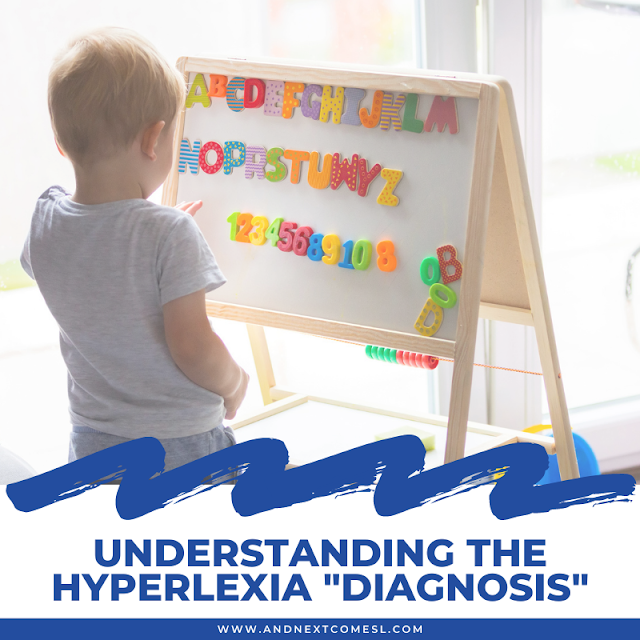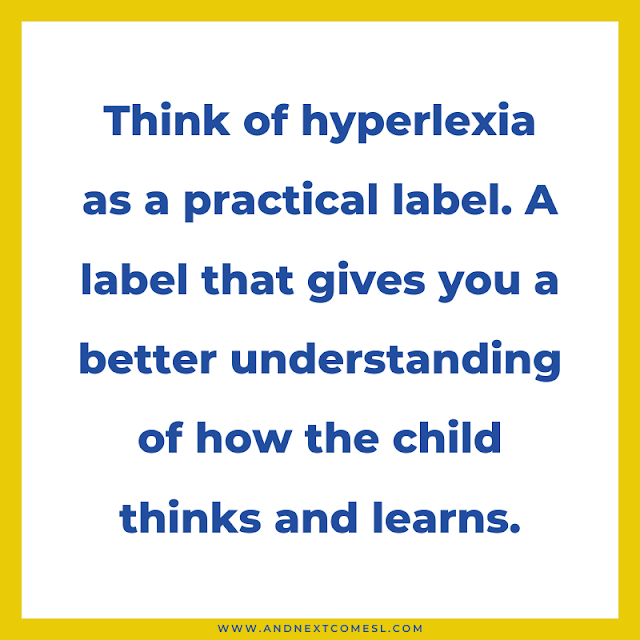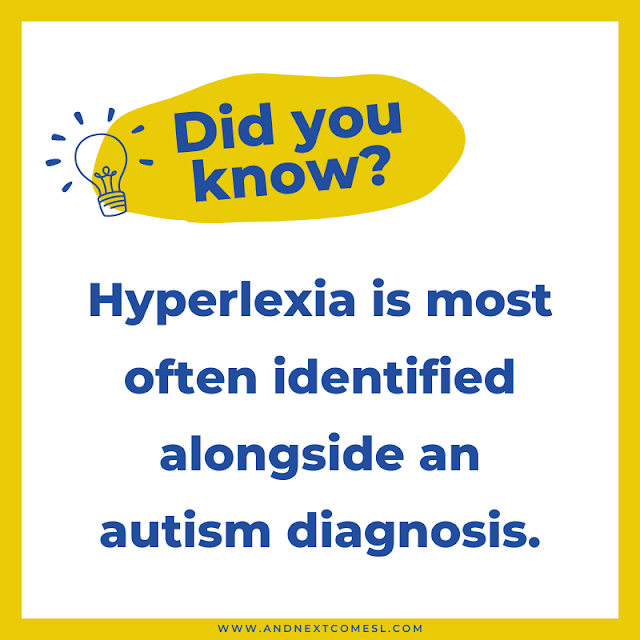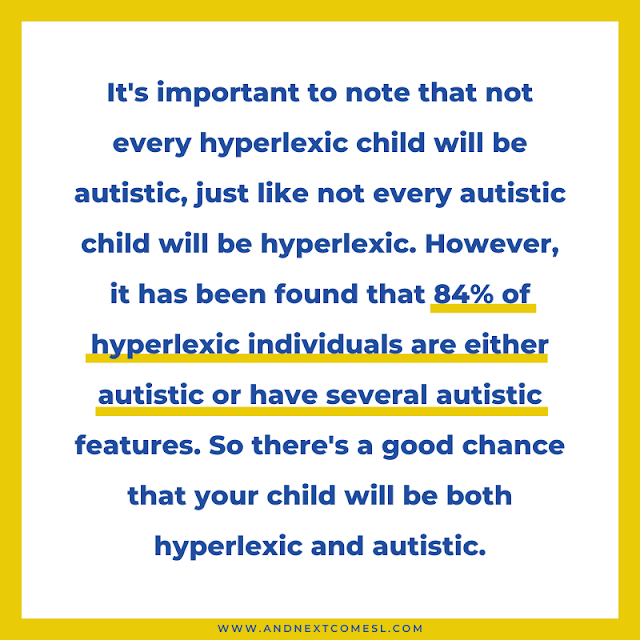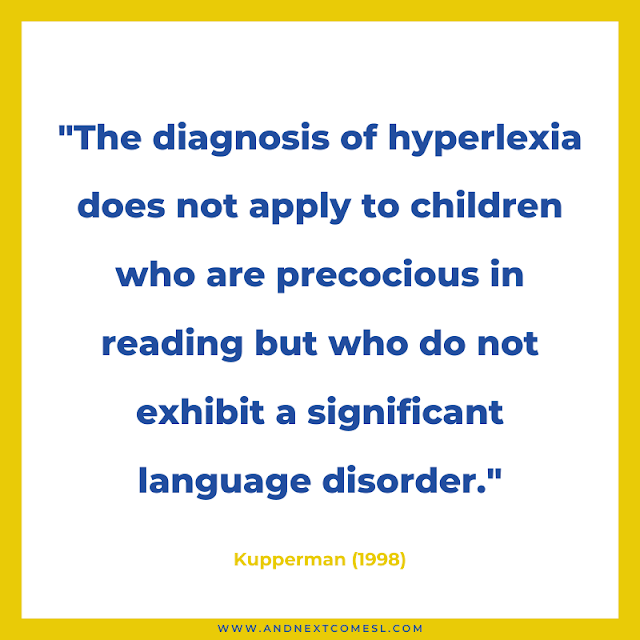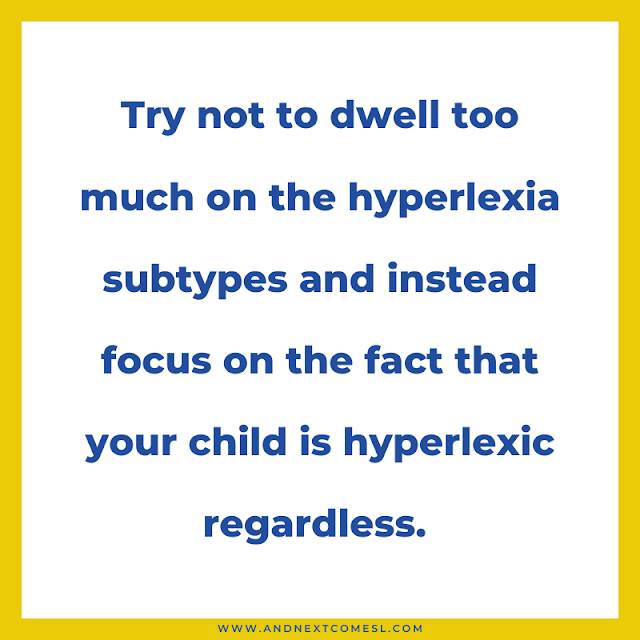One of the most frequent questions that I get asked about hyperlexia is regarding the diagnostic process. Who can diagnose hyperlexia? How can you get the hyperlexia diagnosis? And so on. Important questions, yes, but it isn't as straightforward or easy to answer these questions as one might think.
Because hyperlexia is currently not a standalone diagnosis.
That makes things tricky for parents like myself trying to get help for their child.
So I thought I would cover as much as I can about the "diagnostic" process regarding hyperlexia so you can better understand how to go about getting your child identified as hyperlexic.
Important Points About Identifying the Hyperlexic Child
Hyperlexia is not a diagnosis by itself and, as such, does not appear as an official diagnosis in psychiatric and psychological diagnostic manuals.
Instead, hyperlexia is a practical label.
That means, the label of hyperlexia gives parents, professionals, and educators a better understanding of how the child thinks and learns.
Having a label of hyperlexia also makes it easier to find, develop, and use strategies that will actually help your child, which is why it's important to identify hyperlexia.
Since it isn't a standalone diagnosis, the label of hyperlexia is usually identified alongside another diagnosis (see a list here). Hyperlexia is often identified alongside an autism diagnosis, in particular.
However, hyperlexia can also be identified alongside other diagnoses such as pervasive development disorder or expressive language disorders (see more on page 3 here as well).
Now, it's important to note that not every hyperlexic child will be autistic, just like not every autistic child will be hyperlexic.
However, it has been found that 84% of hyperlexic individuals are either autistic or have several autistic features (source). So there's a good chance that your child will be both hyperlexic and autistic.
What About the 3 Types of Hyperlexia?
Many parents ask how they can get a hyperlexia 3 diagnosis.
Although there have been three types of hyperlexia proposed, most hyperlexic children will just be identified as hyperlexic. Don't expect to receive a diagnosis of hyperlexia type I, II, or III.
There are a couple of reasons for this.
One, the research doesn't necessarily support these three types. They are, after all, just one proposed theory. A dated theory at that.
Two, most professionals don't even know about hyperlexia, let alone the three types of hyperlexia. Hard to "diagnose" something you don't know exists, right?
Finally, there is a lot of disagreement on how to best describe and define hyperlexia. As a result, not all experts agree on the three types and instead "argue that the term hyperlexia be reserved to describe only those individuals who (a) demonstrate a reading comprehension deficit in the absence of deficits in decoding skills and (b) have been diagnosed with ASD." (Robertson, 2019)
Kupperman (1998) also notes that "the diagnosis of hyperlexia does not apply to children who are precocious in reading but who do not exhibit a significant language disorder." (source)
For me, the type doesn't matter. Instead, knowing the term hyperlexia describes my child is all that matters. It gives me the information I need to best understand my kid and better support their needs.
I encourage you not to dwell too much on the type and instead focus on the fact that your child is hyperlexic regardless.
Who Can Identify Hyperlexia?
Your best bet for getting your child identified as hyperlexic is to find a professional who is knowledgeable about hyperlexia. But that's easier said than done, I know.
However, if you can't find someone knowledgeable about hyperlexia, look for someone who is knowledgeable about autism. They're more likely to have heard of and/or have experience with hyperlexia. After all, hyperlexia is quite common in autistic populations (anywhere from 5-10% of autistics are said to be hyperlexic).
Or better yet, look for someone familiar with gestalt language processing. They're the most likely to have heard of hyperlexia and, if not, they will at least be more familiar with how to support their language needs.
From talking with other parents of hyperlexic children over the years, most of their child have been identified as hyperlexic in one of four ways:
- From a psychologist, usually during an autism evaluation
- From a neurologist
- From a speech therapist, often after the parent raises the possibility of hyperlexia
- Self-diagnosed/identified and later confirmed by professionals (not always)
Since hyperlexia is not an official diagnosis, you will likely not receive a "diagnosis" on paper. However, many professionals will either introduce you to the label of hyperlexia or will confirm your suspicions.
🔎Is it Hyperlexia?
You've seen the signs: the letters, the early reading, the unique way they learn. Now to find out if hyperlexia is the name for what you've been seeing and finally make sense of it all.
Personal Experiences with the Hyperlexia "Diagnosis"
We learned about our son's hyperlexia during his autism evaluation when the psychologist mentioned that hyperlexia and hypernumeracy describe his skills and abilities regarding superior decoding and math.
I am still so grateful to the psychologist for introducing us to hyperlexia and hypernumeracy because it certainly made everything so clear! We finally got the answer that we needed and were able to find appropriate strategies to help support my son.
Unfortunately, quite a few speech therapists that we have interacted with over the years haven't heard of hyperlexia or know so little about it. So I don't think we would have been able to get my son identified as hyperlexic in this manner, especially back in 2014. Other parents have had varied experiences with this avenue as well.
Thankfully, though, more and more speech therapists are learning about hyperlexia lately so this avenue will likely become the best option for getting a child identified as hyperlexic going forward.
Especially if you can find a speech therapist who is familiar with gestalt language processing as, like I mentioned earlier, they're more likely to have, at the very least, heard of hyperlexia.
I think that, had I been aware of hyperlexia when J was a toddler, I am positive that I would have self-identified him with it and then raised my suspicions with professionals to confirm the "diagnosis."
Many parents seem to find themselves in this position. They learn about hyperlexia, have a major aha moment, and push professionals to confirm their suspicions (with limited success though - see reasons why here).
Just a quick note to any adults who are discovering that they themselves might be hyperlexic or even to parents who can't find a professional knowledgeable about hyperlexia. Self-identification or diagnosis is totally valid, even without the professional confirmation. Besides, there are barriers that limit access to proper identification and diagnosis and sometimes self-identification is the only option.
Often, it can be really obvious that a child is hyperlexic. Especially when you read descriptions that perfectly match what you are seeing with your child or when you see pictures and videos of other kids with hyperlexia acting exactly like your child.
I know that when I finally googled hyperlexia and watched some videos, looked at photos, and read about hyperlexia that I had finally found what J had. It was 100% clear that he was hyperlexic!
More Information on the Hyperlexia Label and its "Diagnosis"
The best resource that I have come across is this hyperlexia pamphlet from the Canadian Hyperlexia Association, which, unfortunately, does not exist anymore. For further information on the assessment and evaluation process for hyperlexia, carefully review pages 3-5.
If you'd like to learn more about what kinds of assessments are involved in identifying hyperlexia, please read more about how to diagnose hyperlexia here.


